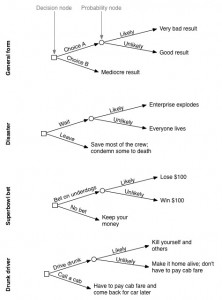In the past few weeks, there have been high-profile legal cases on both sides of the border involving unpaid interns taking legal action against their former venue of unpaid work. (I hesitate to call them “employers.”) Recently, a US judge ruled that the interns working on Fox’s Black Swan should have been paid for their labour. Bell Canada has recently been accused of breaking labour laws with regard to its unpaid interns. This has sparked a great deal of debate, and in what follows, I will respond to the most common defence of unpaid internships: That the intern consented to it. I will not be making a legal argument, even though I will be talking about laws. I am not a lawyer. I am a philosopher by training. I will be making a moral / political / economic argument.
What is the point of a minimum wage law?
The point of a minimum wage law is that we have decided as a society that even if the job market were to deteriorate to the point where a prospective employee was willing to agree to be employed for wages lower than the minimum wage, such an agreement would not be legal. That is the point of a minimum wage law. That is what it means. It is a law. It is not a suggestion or a guideline that can be ignored if both parties agree.
The consent of both parties does not make it okay, and as I will argue below, if a person could just consent to waive her right to a minimum wage, making it optional, that would undermine minimum wage law entirely. Defenders of unpaid internships routinely point to the fact that such programmes are “voluntary,” and that the intern went into the arrangement with her eyes open, knowing that she wouldn’t get paid, and that the interns agreed to work without compensation. They argue that the consent of the unpaid internship voids her right to claim a minimum wage.
While it is true that these programmes are voluntary, consent doesn’t get Bell out of its moral obligations to its employees. The fact that the interns weren’t slaves—kidnapped and locked in an office building to work for Bell against their will—doesn’t mean that what Bell did wasn’t exploitative.
The argument boils down to the proposition that if a person decides to work for $0 per hour (or “for job experience” or “for the networking opportunities”), she has every right to do so. After all, what business is it of ours to say that she can’t spend her time the way she likes?
The economics of hockey helmets
Economists and game theorists call these sorts of things “coordination problems.” A famous example identified by Thomas Schelling is the Hockey Helmet Problem which goes as follows: In the 1970’s, NHL hockey players were allowed, but not required to wear helmets, and most did not wear them. A secret ballot of these hockey players confirmed that they would prefer to wear them, but did not because they worried about losing the competitive advantage of peripheral vision as well as a certain “tough guy” image. As Teddy Green of the Bruins said in 1969, “It’s foolish not to wear a helmet. But I don’t—because the other guys don’t. I know that’s silly, but most of the players feel the same way. If the league made us do it, though, we’d all wear them and nobody would mind.” (Schelling, “Hockey Helmets, Concealed Weapons, and Daylight Saving”, The Journal of Conflict Resolution, 17(3):381–428, 1973.)
By making helmets mandatory, NHL players no longer had to choose between their personal safety and their hockey performance. By making the helmet rule, the NHL was saying that players shouldn’t even have to make that choice and that it was wrong to even ask them to do so.
Let me emphasise—now that the rule about hockey helmets is in place, NHL players can’t just choose to play without helmets, even if they want to. If that were allowed, it would make helmet-wearing optional again, and it would undermine the point of having the rule in the first place. This is a good analogy for minimum wage.
Analogy to minimum wage
In most cases, we rightly take what a person would consent to as a pretty good proxy for that person’s own idiosyncratic values. That is to say, in most cases where a person is willing to consent to something, she has made a subjective appraisal in favour of it, according to her own values. This is why we think it’s paternalistic to impose many restrictions on what a person can consent to do with her time / money / body / etc. This intuition is what gives the “it was voluntary” argument its moral force. A person’s self-interested behaviour is usually well-aligned with her own values.
In the Helmet Problem, the self-interest of NHL players was actually working against their own values, and so, a restriction that could have been framed in terms of a loss of freedom on the part of the players (“Who are you to tell me that I have to wear a helmet?”) was actually necessary to enable the players to coordinate and allow them all to do what they wanted to do. Put in moral terms, it was wrong to even make the NHL players choose between them in the first place.
Similarly, the self-interest of unpaid interns has been used against them in a morally problematic way and coordination through regulation will best respect their values and best interests. If a company is allowed to get away with offering an unpaid internship, a prospective intern has to choose between getting job experience / networking on the one hand and supporting herself financially on the other. If anyone is allowed to get away with working for less than the minimum wage (like at an unpaid internship), the minimum wage becomes optional for everyone. This defeats the purpose of having a minimum wage law in the first place, which is to ensure no one has to compete in a job market with free labour.
By having a minimum wage law, what we are saying is that in the same way that a hockey player shouldn’t be made to choose between his personal safety and his performance, an intern shouldn’t be made to choose between getting job experience and getting paid. Further, by having a minimum wage law, we are saying that an intern doesn’t get to make that choice, even if she wants to. That’s the whole point of the law.
I still disagree with you
If you don’t want to live in a society where there is a minimum wage, that’s fine. We have a democratic process for passing legislation that allows us to change laws as we see fit, but at least in 2013, in Canada and the US, the law is that work must be compensated with a minimum amount of money per hour, whether you’d be willing to work for less or not.



